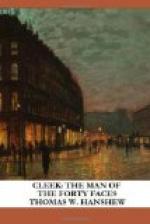“Of course, of course!” commented Cleek enigmatically. “Provided my theory is correct, I should have expected that. A thing that comes and goes through windows must, at some period, leave some mark of its passage. Of course that particular window opened upon a balcony or something of that sort, didn’t it?”
“No, it is a perfectly unbroken descent from the window sill to the ground. But there’s a big tree close by, and the branches of that brush the pane of glass.”
“Ah! I see! I see! All the soap dishes in the house left filled last night and found filled this morning, captain?”
“Good heavens! I don’t know. What on earth can soap dishes have to do with it, man?”
“Possibly nothing, probably a great deal—particularly if there’s found to be a cake of soap in each. But that we can discover later. Now one word more. Was that same minute swelling—the mark like a gnat’s bite—on the neck of the boy’s body, too? And had it been on that of the mother’s as well?”
“I can’t answer either question, Mr. Cleek. I don’t remember to have heard about it being remarked in the case of Mrs. Comstock’s death; and the murder of little Paul was such a horrible thing and so upset everybody that none of us thought to look.”
“An error of judgment that; however, it is one easily rectified, since the body is not yet interred,” said Cleek. “Ever read Harvey’s ‘Exercitatio Anatomica de Motu Sanguinis,’ Captain?—the volume in which William Harvey first gave to the world at large his discovery regarding the circulation of the blood.”
“Good heavens, no! What would I be doing reading matters of that kind? I’m not a medico, Mr. Cleek—I’m a soldier.”




